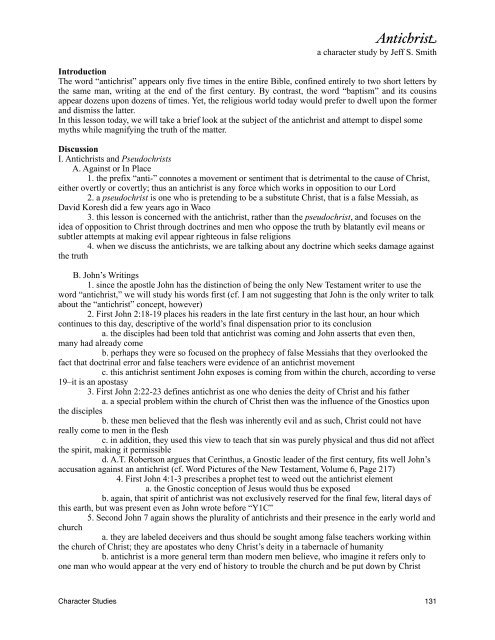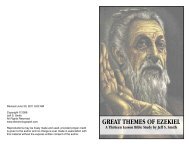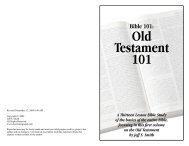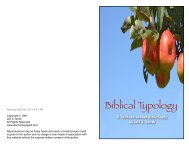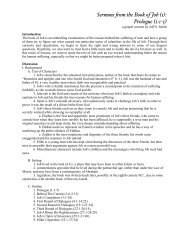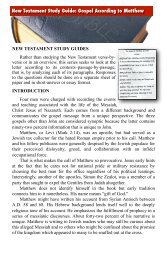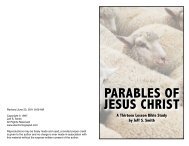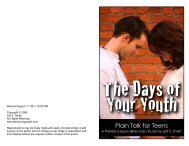Character Studies - ElectronicGospel
Character Studies - ElectronicGospel
Character Studies - ElectronicGospel
- No tags were found...
You also want an ePaper? Increase the reach of your titles
YUMPU automatically turns print PDFs into web optimized ePapers that Google loves.
Antichrista character study by Jeff S. SmithIntroductionThe word “antichrist” appears only five times in the entire Bible, confined entirely to two short letters bythe same man, writing at the end of the first century. By contrast, the word “baptism” and its cousinsappear dozens upon dozens of times. Yet, the religious world today would prefer to dwell upon the formerand dismiss the latter.In this lesson today, we will take a brief look at the subject of the antichrist and attempt to dispel somemyths while magnifying the truth of the matter.DiscussionI. Antichrists and PseudochristsA. Against or In Place1. the prefix “anti-” connotes a movement or sentiment that is detrimental to the cause of Christ,either overtly or covertly; thus an antichrist is any force which works in opposition to our Lord2. a pseudochrist is one who is pretending to be a substitute Christ, that is a false Messiah, asDavid Koresh did a few years ago in Waco3. this lesson is concerned with the antichrist, rather than the pseudochrist, and focuses on theidea of opposition to Christ through doctrines and men who oppose the truth by blatantly evil means orsubtler attempts at making evil appear righteous in false religions4. when we discuss the antichrists, we are talking about any doctrine which seeks damage againstthe truthB. John’s Writings1. since the apostle John has the distinction of being the only New Testament writer to use theword “antichrist,” we will study his words first (cf. I am not suggesting that John is the only writer to talkabout the “antichrist” concept, however)2. First John 2:18-19 places his readers in the late first century in the last hour, an hour whichcontinues to this day, descriptive of the world’s final dispensation prior to its conclusiona. the disciples had been told that antichrist was coming and John asserts that even then,many had already comeb. perhaps they were so focused on the prophecy of false Messiahs that they overlooked thefact that doctrinal error and false teachers were evidence of an antichrist movementc. this antichrist sentiment John exposes is coming from within the church, according to verse19–it is an apostasy3. First John 2:22-23 defines antichrist as one who denies the deity of Christ and his fathera. a special problem within the church of Christ then was the influence of the Gnostics uponthe disciplesb. these men believed that the flesh was inherently evil and as such, Christ could not havereally come to men in the fleshc. in addition, they used this view to teach that sin was purely physical and thus did not affectthe spirit, making it permissibled. A.T. Robertson argues that Cerinthus, a Gnostic leader of the first century, fits well John’saccusation against an antichrist (cf. Word Pictures of the New Testament, Volume 6, Page 217)4. First John 4:1-3 prescribes a prophet test to weed out the antichrist elementa. the Gnostic conception of Jesus would thus be exposedb. again, that spirit of antichrist was not exclusively reserved for the final few, literal days ofthis earth, but was present even as John wrote before “Y1C”5. Second John 7 again shows the plurality of antichrists and their presence in the early world andchurcha. they are labeled deceivers and thus should be sought among false teachers working withinthe church of Christ; they are apostates who deny Christ’s deity in a tabernacle of humanityb. antichrist is a more general term than modern men believe, who imagine it refers only toone man who would appear at the very end of history to trouble the church and be put down by Christ<strong>Character</strong> <strong>Studies</strong>! 131


